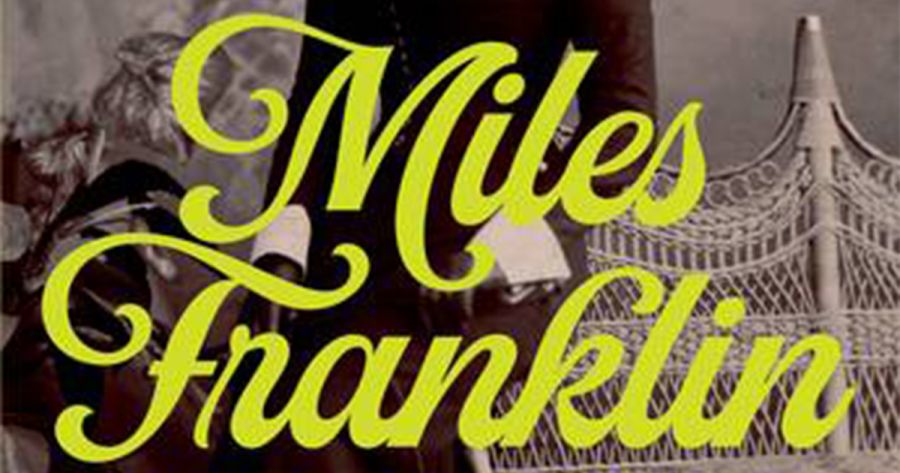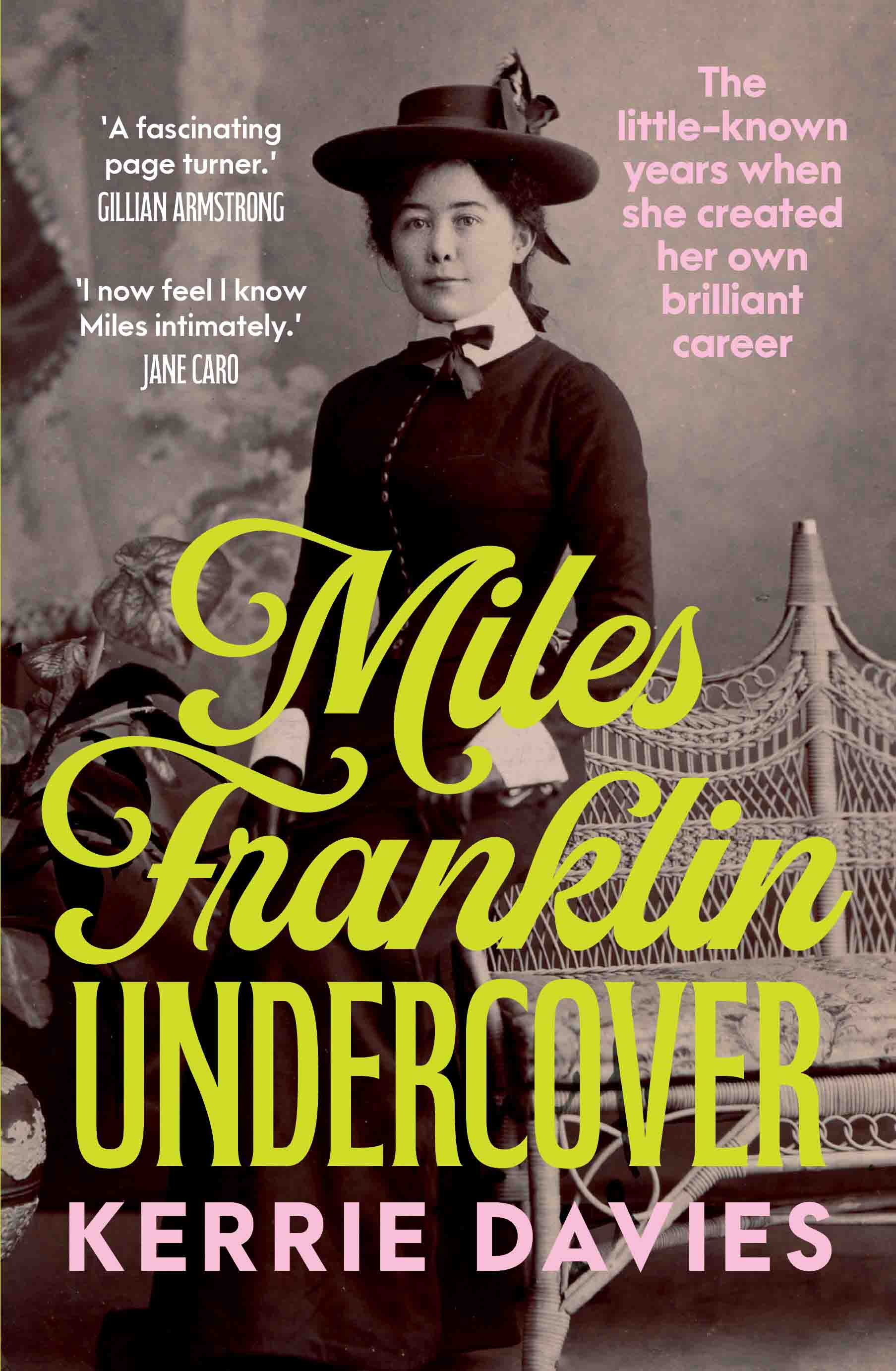
- Free Article: No
- Contents Category: Biography
- Review Article: Yes
- Article Title: Restless talent
- Article Subtitle: A new take on Miles Franklin
- Online Only: No
- Custom Highlight Text:
In literary careers, straightforward narrative arcs are less the rule than the exception. A writer can begin with a resounding debut, only to stumble at what in the music business is called the ‘difficult second album’. Authors can change genres and audiences; fail at achieving significant sales figures; succumb to hostile reviews, or simple indifference. Miles Franklin expressed it best in her novel title My Career Goes Bung (1946).
- Book 1 Title: Miles Franklin Undercover
- Book 1 Subtitle: The little-known years when she created her own brilliant career
- Book 1 Biblio: Allen & Unwin, $34.99 pb, 369 pp
- Book 1 Cover Small (400 x 600):

- Book 1 Cover (800 x 1200):

- Book 1 Readings Link: https://www.readings.com.au/product/9781761470936/miles-franklin-undercover--kerrie-davies--2025--9781761470936#rac:jokjjzr6ly9m
Franklin’s more famous My Brilliant Career (1901) combined Australiana with all the hope of the New Woman heroine, for whom a vocation meant more than marriage and motherhood. This novel had a famously easy run for the book industry: she sent the manuscript to Henry Lawson, who was charmed by it. He generously recommended the work to his agent James Pinker, the best in the business. Publication brought acclaim, for Miles had caught the spirit of the times, expressed with lively wit and an attractive heroine. The extent to which Sybylla Melvyn appealed is shown by the sheer number of fan letters Miles received from similar, aspirant young women.
One quoted in this book declared: ‘How I have revolted against being a girl and tried so hard to earn my own living.’ Miles would discover that expressing revolt in novel form, however well, did not necessarily mean she herself could earn a living from writing. Even though she had been lucky, her sales did not ensure financial stability.
What Katy Did Next, Miles did next, and this is the focus of this book. It sits in the interstices between two other books on Franklin: Jill Roe’s magisterial and exhaustive Stella Miles Franklin: A Biography (2008) and Gail Jones’s Salonika Burning (2022), a novel about Franklin’s World War I experience. Davies, who has previously written the non-fiction A Wife’s Heart (2017), about the breakdown of Henry and Bertha Lawson’s marriage, here essays a more novelistic account, based on fact. She draws on Roe to create a lived-in biography, best described as creative non-fiction. It depicts Miles over fifteen years as she progressed from wonder-girl writer to confident and experienced woman.
Unlike her contemporary Ethel Turner, Franklin did not turn out title after title, selling respectably over decades. Turner also married well, being a rather more conventional figure. Miles had admirers, some wildly unsuitable. Norman Lindsay would surely have been a marriage in hell. Banjo Paterson offered collaboration or something less; in the end, he married money. Miles remained single, her own choice.
To be truly independent, she needed income. Heartbreakingly, her new novels kept being rejected. My Career Goes Bung took forty-five years to reach print. The stalemate led her to a bold decision. American investigative journalist Nelly Bly had gone undercover to report on women’s working conditions, and Franklin saw an opportunity to do likewise. She donned a white cap and apron, becoming an undercover housemaid.
Her year of servitude produced a manuscript titled ‘When I was Mary Anne, a Slavey’, which Davies initially sought to transcribe and publish. The difficulty was that the text contained different forms, from diary to journalese – in fact, it was something of a mess. Furthermore, Franklin’s attitudes are not likely to appeal to modern readers. Consider the conventional, casual anti-Semitism of the time, for instance. But the manuscript did help Davies in her own exploration of Franklin.
And what a story is revealed here! In the Victorian household, servants were distanced by class but sheer proximity meant that they knew their bosses intimately. That servants were spying was typical employer paranoia; Mary Anne, however, really was a snooper of secrets. Franklin was willing to perform domestic duties, yet the work was incessant, poorly paid, and with little time off – hence her use of the term ‘slavery’. It was dangerous, too, for a gas explosion at the stove burnt her face, and could have cost her her sight.
Davies in this book is a conduit for Franklin’s experience, demonstrating what an acute observer of character she was. The master of the house becomes a bantam cock, the milkman comes courting, and the mistress is jealous of Franklin’s luxuriant hair. Alas, this incisive journalism was just a little too close to life, recognisably so. The publishers feared a libel suit and, like her other manuscripts, ‘When I was Mary Anne’ remained unpublished, in this case permanently.
Franklin had always been rebellious, but the experience of service radicalised her. If the solution to the servant question was a good union, then that would be her next step. Since she could not crusade in novel form, like Dickens, she would use her skills to agitate. She took ship to the United States, where she worked for the Women’s Trade Union League. For conservative literary critics such as Colin Roderick, such activism was a waste of her time, which would have been better spent writing or marrying. Biographer Verna Coleman termed it Franklin’s ‘(unknown) Brilliant Career’. What Davies conveys is how vital and exciting these years were. Franklin worked at the cutting edge of women’s labour rights, among the very best in the movement.
The book adds up ultimately to a study of a woman reinventing herself, of an author finding important work and fulfilment elsewhere. Franklin did not want for suitors, but would neither sell herself, nor be a ‘slavey’ for her spouse. As she had achieved independence by her own efforts, she did not need a master. She was her own mistress, in control.
Miles Franklin Undercover does not have the weight of Roe’s biography, nor the lyricism of Salonika Burning. It is, instead, a slice of Franklin’s life, an important transition period conveyed with the irreverence and liveliness of Franklin herself. Davies does not inhabit her subject, rather observing her from the basis of fact and sound speculation. It is true to Franklin, that restless talent, and excellent testimony to the richness of her life.


Comments powered by CComment